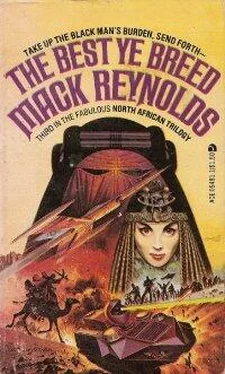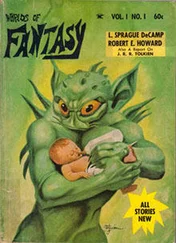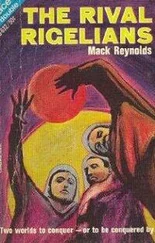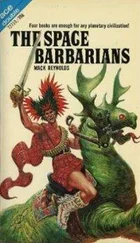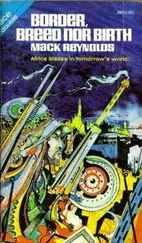Mack Reynolds - The Best Ye Breed
Здесь есть возможность читать онлайн «Mack Reynolds - The Best Ye Breed» весь текст электронной книги совершенно бесплатно (целиком полную версию без сокращений). В некоторых случаях можно слушать аудио, скачать через торрент в формате fb2 и присутствует краткое содержание. Год выпуска: 1978, ISBN: 1978, Издательство: Ace Books, Жанр: Фантастика и фэнтези, на английском языке. Описание произведения, (предисловие) а так же отзывы посетителей доступны на портале библиотеки ЛибКат.
- Название:The Best Ye Breed
- Автор:
- Издательство:Ace Books
- Жанр:
- Год:1978
- ISBN:0-441-05481-1
- Рейтинг книги:4 / 5. Голосов: 1
-
Избранное:Добавить в избранное
- Отзывы:
-
Ваша оценка:
- 80
- 1
- 2
- 3
- 4
- 5
The Best Ye Breed: краткое содержание, описание и аннотация
Предлагаем к чтению аннотацию, описание, краткое содержание или предисловие (зависит от того, что написал сам автор книги «The Best Ye Breed»). Если вы не нашли необходимую информацию о книге — напишите в комментариях, мы постараемся отыскать её.
The Best Ye Breed — читать онлайн бесплатно полную книгу (весь текст) целиком
Ниже представлен текст книги, разбитый по страницам. Система сохранения места последней прочитанной страницы, позволяет с удобством читать онлайн бесплатно книгу «The Best Ye Breed», без необходимости каждый раз заново искать на чём Вы остановились. Поставьте закладку, и сможете в любой момент перейти на страницу, на которой закончили чтение.
Интервал:
Закладка:
Meg frowned at her thoughtfully.
Isobel shrugged and said, “It’s not the only unloved place to which the white man goes in search of his god, money. The same applies to the far north. The area around Point Barrow, in most northern Alaska, is similar. It is Esquimo country, and the Esquimo would live nowhere else happily. The white man’s camps there are the equivalent of those in the Sahara with cold and snow rather than heat and sand. And none can wait to leave the north behind and return with his fantastically high pay to his own land.”
Meg shook her head, trying to assimilate it. “But how long do you intend to remain… Isobel? You yourself are an American, aren’t you? And used to the comforts of… civilization.”
Isobel sighed, finished her coffee and readied herself to come to her feet. She said, “I imagine I’ll be here for the rest of my life. The job is a big one. I was born in America, but racially I am an African. I have the El Hassan dream, to bring my people out of the Dark Ages. We can’t expect others to do it. The white man comes to North Africa solely to exploit it, in one way or the other.”
She stood and looked down at the attractive Irish girl and wound it up by saying, “I understand that Ireland, in her day, also had to fight to gain her independence.”
Meg looked at her emptily. Both of her grandfathers had died in the Black and Tan fighting with the British.
For some reason, unbeknownst even to herself, Isobel had forbidden the white soldiers of fortune to leave the limits of Fort Laperrine but had given Lon Charles freedom to go where he would in Tamanrasset. Her excuse was that he was a black and in no danger, but that she was unable to guarantee the safety of whites. Which wasn’t true. There were quite a number of European and American journalists, diplomatic representatives, and trade delegations in the area now and more coming in weekly. Most of these refrained from going into the the native areas and remained in their little ghetto on the outskirts of town of western tents, trailers and campers, contemptuous of what they considered the filth of the Saharan center. But the brave, usually accompanied by some of Guémama’s men as guards, occasionally roamed the streets, bringing no more reaction than curiosity and not much of that since whites, including traders, missionaries and even tourists had still sometimes come to Tamanrasset even after the evacuation of the French.
Now, on her way back from town to check out a matter with one of the local bashaws, she ran into the green bereted American. He had obviously been in one of the two or three cafés Tamanrasset supported and where beer and even the atrocious tasting date wine was available. Alcoholic drink was forbidden the good Moslem, but all Moslems are not good ones, and, besides, in this part of the Sahara, all did not follow Islam. Some tribesmen were pagans, and a few even Christians, converted by the missionaries who had plowed millions of dollars, francs and pounds into this area, for the sake of a handful of converts.
The call on the pasha had been routine. Word had come to her that he was shaking down the peddlers of kif in the souk. While she, as well as Homer and the others of the inner El Hassan group, had no brief for what the Americans called marijuana; they took no stand against it. Cannabis sativa had been used as an escape from reality since it had wended its way to this part of the world from far China, so remote in history as to be unrecorded.
The bashaw had been aghast. He assured the Sitt Izubahil that for as long as the memory of man his family had leveled a tax on all local sale of kif .
No more, she had told him coldly and hoped that it would not be necessary to bring the matter to the attention of El Hassan whose love for the people was such that he could not condone their being exploited.
Sooner or later, she thought sourly, as she left him, they would have to have a showdown with these racketeers. It should add immeasurably to the prestige of El Hassan in the eyes of the people, their victims.
Lon Charles had removed his beret and said, “Top of the afternoon, Miss Cunningham.” He looked back over his shoulder at the town and grinned. “It’s a long way from Newark.”
She laughed and said, “How did you know? But it was Teaneck, not Newark.”
He grinned again and put his battered beret back on his head, in protection from the sun. She herself wore a sun helmet.
“Jersey is Jersey,” he said. “You can tell.”
She said, “Are you heading back for the fort? Why don’t you walk along with me?”
He fell into step beside her.
She said, “You’re as far away from home as I am. Have you ever returned…” she indicated his green beret “… since Vietnam?”
He shook his head. “No. No, there’s nothing for an uneducated black in the States.” He thought about it. “And nowhere else for that matter. I was seventeen when I took up soldiering, and I’m still at it.”
She said, “It’s possible for even a black to get an education, Lon. You’ve got an inferiority complex.”
He chuckled and said, “It’s not an inferiority complex. I am inferior. Look at that Megan McDaid. She’s not half my age and she’s a doctor.”
Isobel shot a look at him from the side of her eyes as they walked along. She said, “So is Jimmy Peters and so is Doctor Smythe. For that matter, so is El Hassan. I’ve got a master’s degree. The fact that you’re black hasn’t anything to do with your intelligence.”
He shook his head again. “You’re only partly right. Sure some of us can fight our way up to where we’ve got as good an education as whitey. But, face it, on an average the black can’t compete with a white, or even a Jap or Chink, for that matter.”
She scoffed. “Lon, you’re believing the other guy’s propaganda. When our Nordic friends and other whites were running around in animal skins and squatting round campfires gnawing on half cooked bones, civilization was beginning here in Africa. Most of the fundamentals originated right here on this continent.”
He stared at her. “Man, you have flipped. Civilization started in Babylonia, in Greece, and later Rome.”
It was her turn to shake her head. “Have you ever heard of Egypt? The ancient Egyptians came down the Nile from Nubia, from Ethiopia. They were blacks. Whitey’s been trying to explain it away ever since; he simply can’t bear the idea. The Greeks were johnnies-come-lately, not to speak of the Romans, and they inherited most of their civilization from the Egyptians. The sciences, the arts, engineering, mathematics, astronomy, so forth and so on, all went through their infancy in Egypt. Even the Tigris-Euphrates civilizations were later. Practically all of the big breakthroughs in man’s development were made either in Africa or in Asia. From all the anthropologists can tell us, man himself originated somewhere to the southeast of here.”
Lon Charles was scowling. “The Egyptians weren’t blacks,” he said.
“No? What were they, then? Where did they come from? The very first signs of their culture were found in the upper reaches of the Nile. Take a look at their statues, with their thick lips, their flattish noses. They were blacks then and are still predominately blacks in spite of all the whites that have mixed with them after the various conquests. Their civilization lasted for thousands of years before it fell to white armies. Admittedly, the white race has produced the best soldiers, the greatest inventors of new weapons, up to and including nuclear ones. The Egyptians were never much for the military. But it wasn’t just Egypt. During the Dark Ages of Europe, Timbuktu, only a few hundred miles from here, surpassed the Rome, London or Paris of the time. Its universities and libraries were preserving the classics of Greece and Rome while the religious fanatics of Europe were erasing such works so they could use the parchment for inscribing crackpot supposedly holy books.”
Читать дальшеИнтервал:
Закладка:
Похожие книги на «The Best Ye Breed»
Представляем Вашему вниманию похожие книги на «The Best Ye Breed» списком для выбора. Мы отобрали схожую по названию и смыслу литературу в надежде предоставить читателям больше вариантов отыскать новые, интересные, ещё непрочитанные произведения.
Обсуждение, отзывы о книге «The Best Ye Breed» и просто собственные мнения читателей. Оставьте ваши комментарии, напишите, что Вы думаете о произведении, его смысле или главных героях. Укажите что конкретно понравилось, а что нет, и почему Вы так считаете.
